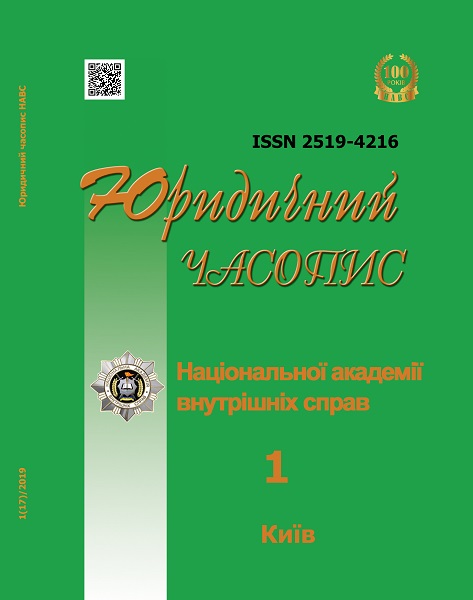The Legal Status of the Initiator of Psychophysiological Research using a Polygraph
Abstract
The purpose of the study is the need to improve the theoretical and applied components of initiating psychophysiological research using a polygraph as well as defining and improving the legal and administrative-legal status of the initiator of psychophysiological research using a polygraph. The basis of the methodology of scientific research are general and special methods, methods of scientific knowledge, the use of which is determined by the purpose and objectives of the study. Scientific novelty. Issues if initation of psycho-physiological researches with the use of polygraph in Ukraine are considered. The current state of regulatory legal regulation of the procedure for carrying out the research with the use of polygraph and the person to be initiated by this study is analyzed. The essence elements and types of legal status are analyzed. Conclusion. The necessity of improvement of theoretical and applied components of issues of initiation of psycho-physiological researches with the use of a polygraph is determined as well as improvement of the legal and administrative legal status of the initiator of psycho-physiological researches with the use of polygraph. Certain categories of people who can and can’t be considered as initiators of psycho-physiological research with the use of polygraph. A universal determination of the initiator of a psycho-physiological study with the use of a polygraph is formulated. The rights and obligations of such person are defined. Formulated circumstances the obligatory presence of which will allow the appointment of conducting psycho-physiological studies using a polygraph. Offered suggestions for improving the normative strengthening of the legal status of the initiator of psycho-physiological research using polygraph.
Keywords: polygraph; initiator; psychophysioilogical research; use; method.
Downloads
Abstract views: 128 PDF Downloads: 117
Copyright (c) 2019 Law Magazine of the National Academy of Internal Affairs

This work is licensed under a Creative Commons Attribution-NonCommercial-NoDerivatives 4.0 International License.
- Authors reserve the right to authorship of their own work and transfer to the magazine the right of the first publication of this work under the terms of the Creative Commons Attribution License, which allows other persons to freely distribute published work with mandatory reference to authors of the original work and the first publication of an article in this magazine.
- Authors have the right to enter into separate additional agreements on non-exclusive dissemination of the work in the form in which it was published in the journal (for example, to post an article in the institution's repository or to publish as part of a monograph), provided that the link to the first publication of the work in this journal is maintained.
- The journal's policy allows and encourages the posting of articles by authors on the Internet (for example, in electronic storehouses of institutions or on personal websites), both before the submission of this manuscript to the editorial office and during its editorial processing, as this contributes to the creation of a productive scientific discussion and positively affects the efficiency and dynamics of citing the published work.




